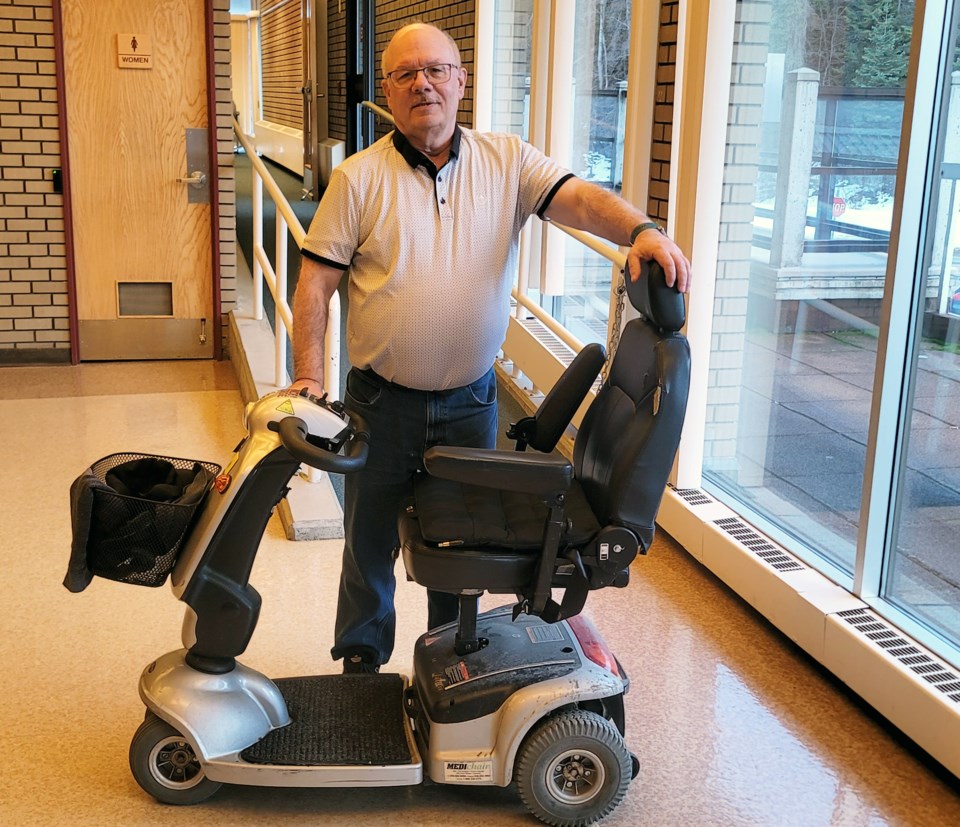Ken Biron has challenged Prince George Mayor Simon Yu and city councillors to put themselves behind the driver’s seat of his mobility scooter.
Biron, 58, drove his scooter 14 blocks from his Third Avenue and Winnipeg Street apartment to City Hall so he could attend Monday’s public meeting to provide a report as acting chair of the city’s Advisory Committee on Accessibility and Inclusion.
Biron spoke about the group’s efforts to implement the 2023 work plan and outlined the work they have done to identify and remove barriers (physical, social and attitudinal) that make it difficult for people with mobility problems to access public buildings, sidewalks and roadways.
He then asked council members if they would like to try it out for themselves getting around the city using a wheelchair.
“We’re always trying to get city council to grab a wheelchair and drive around the city, it’s fun,” said Biron.
“It would be an experience for anybody, and for them to see what the problems are. If they had it themselves, it would be fixed – all they have to do is experience it.
“British Columbia and Canada as a whole are aging, people are living longer and there’s a higher incidence of mobility problems and getting your driver’s licence taken away. Your living conditions are changed when you’ve got a device like this. I live without a vehicle, it’s very common.”
Biron was diagnosed with multiple sclerosis when he was 34, and within a year the disease had progressed to the point where his mobility was seriously impaired.
“I actually walked into a wall in 1999 and my life changed,” he said. “In 2000 they said, ‘You’ve got MS,’ and it took my five years to wrap my head around that.
“I was an active worker. I was in the (army) reserve force as a civilian instructor with cadets and worked in the forest service for many years of my youth firefighting. Sad to say, most of the time it either takes an accident or an illness and then they discover the barriers. I want to do something about it and this is how I’m going to do it.”
He’s been riding a motorized scooter since 2002. His current ride is limited to 10 kilometres per hour.
When it’s too snowy or cold or he has travel far from his home, Biron relies on BC Transit’s handyDART door-to-door and fixed-route service. He said all the buses in the city are easily accessible to him and his scooter and that puts Prince George ahead of some Canadian cities.
“We had the most successful transit in the nation, we would drop our ramps at every stop, all the operating hours seven days a week 365 days a year. If somebody with a device can get to a bus stop they can take them.”
Biron said Prince George has changed for the better in recent years and he has better access to public facilities and the city has made sidewalk improvements with more corners installed that drop down to street level. The biggest change for him, which came out of the pandemic, is virtual meetings became commonplace and he no longer had to leave his home to attend meetings in person.
But there’s still much work to be done and he continues that through his work on the committee and as a part-time administrator at Handy Circle Resources.
“Getting to this meeting is a lot easier than it was a decade ago,” he told council. “We’ve come a long ways we’ve come so far, but we’ve got way further to go.
“I hope that Prince George eventually becomes a city that accepts everybody in the world to come here.”



